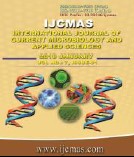


 National Academy of Agricultural Sciences (NAAS)
National Academy of Agricultural Sciences (NAAS)

|
PRINT ISSN : 2319-7692
Online ISSN : 2319-7706 Issues : 12 per year Publisher : Excellent Publishers Email : editorijcmas@gmail.com / submit@ijcmas.com Editor-in-chief: Dr.M.Prakash Index Copernicus ICV 2018: 95.39 NAAS RATING 2020: 5.38 |
Sixty one out of 200 isolates, isolated from chickpea rhizospheric soils, were found to be effective to control the mycelial proliferation of the test pathogen Fusarium oxysporum f. sp. ciceris, maximum being with Ps16b (45.7%) and Ps45 (87.3%) in dual culture plate and liquid broth assay. Growth inhibition of the phytopathogen was also recorded by diffusible and volatile antifungal metabolites produced by the isolates. All the isolates showed ammonia production, whereas only nine isolates were recorded for Hydrogen cyanide production. Five potent antagonists (Ba1a, Ba19, Ps44, Ps45 and Ps47), selected on the basis of antagonistic traits were evaluated under greenhouse conditions to control fusarium wilt in chickpea varieties GPF-2 and JG-41. Maximum reduction in disease incidence was recorded with Ps45 (74.48±0.67 %) and (70.32±1.00%) compared to fungicide treatment (61.53±0.89% and 58.69±0.33%) in chickpea genotypes GPF-2 and JG-41 respectively. Rhizobacterial isolates Ps45, Ps47 and Ba1a inoculation alongside Mesorhizobium were found effective in promoting seed emergence and in controlling the disease severity.
 |
 |
 |
 |
 |